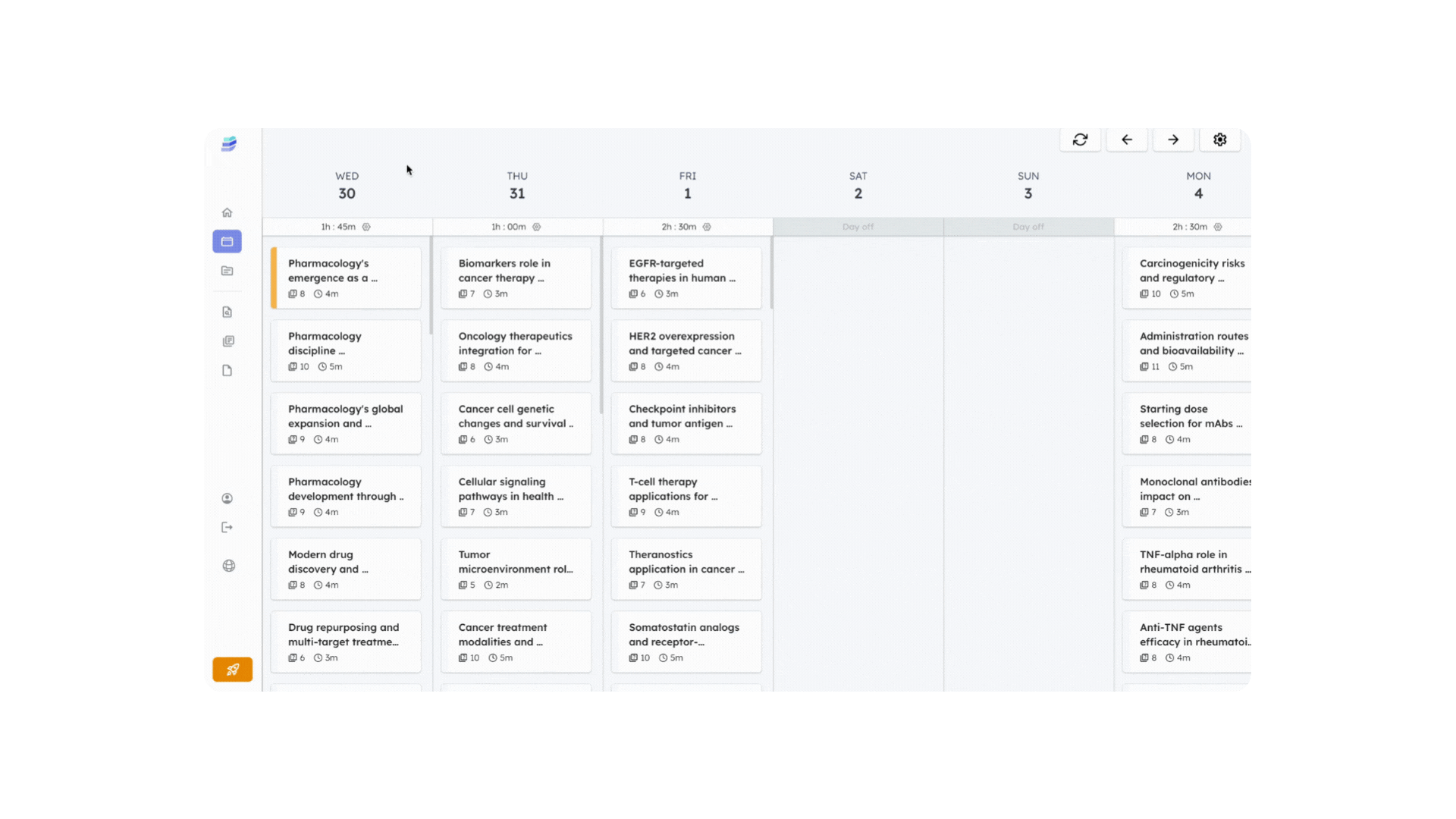
Share with your student friends
ShareGet ready for your next exam
Start for freeIf you’ve ever found yourself studying for hours but still feeling unprepared, you’re not alone. Most students develop their own study method—reading notes, highlighting, making flashcards—but sometimes even the most dedicated efforts don’t lead to real progress.
Dende doesn’t try to change your method. Instead, it helps you organize it better, focus on what really matters, and keep track of what’s working.
In this article, we’ll show how Dende can fit into different study styles, with real-life examples of how it supports students in turning effort into results.
1. From notes to smart sessions: using what you already have
Most students already have materials: lecture slides, PDFs, personal notes. The problem isn’t having too little to study—it’s figuring out where to start and how to manage the overload.
With Dende, you don’t need to reorganize everything:
- You just upload your file—say, the slides from your physiology course
- The platform automatically identifies chapters and breaks the content into topics: short, focused blocks like “neurotransmitters” or “cardiac output.”
This doesn’t mean Dende tells you how to study. It simply gives structure to the material you already have. Instead of scrolling through a 70-page PDF wondering what to prioritize, you get a list of manageable study units that you can work through one at a time.
📌 Real example: You’re preparing for your physics exam and upload your lecture notes from the semester. Instead of going through them page by page, you can use Dende’s auto-generated topics to focus each day on a single concept—like kinematic equations, Newton’s laws, or electric fields. You still read and take notes the way you normally would, but now with a structured plan that helps you stay on track and avoid missing key topics.
The goal here isn’t to replace your way of learning—it’s to help you use it more effectively. Breaking material down into smart, trackable pieces is the first step toward studying with purpose, not panic.
2. Quizzes and flashcards that support your learning
Reading, underlining, and summarizing are useful, but they often stay on the surface. The real challenge comes when you need to retrieve information—not just recognize it. That’s where active recall makes a difference.
Dende doesn’t replace reading, but adds a layer of active practice. For each topic, it offers quiz questions and flashcards that force you to recall concepts, not just re-read them. This helps you understand what you’ve really learned—and what you’re just familiar with.
📌 Real example: You’re studying histology and feel confident about epithelial tissues—until you try Dende’s topic quiz and realize you’re mixing up the different types and their functions. The platform marks that topic yellow (meaning: not yet mastered) and reschedules it for review. A few days later, you see it again. This time, you answer everything correctly, and the topic turns green.
Flashcards work similarly. During the review phase before an exam, students can use them to speed up memorization and test themselves quickly, even between classes or on a commute.
These small moments of practice—one topic at a time—build long-term retention. And because Dende tracks your results, you don’t waste time on what you already know.
3. A calendar that adapts to you (not the other way around)
One of the biggest challenges in studying isn’t motivation—it’s time. Between lectures, labs, part-time jobs, and life in general, few students follow a perfect, fixed routine. That’s why rigid study plans often fail after a week.
Dende’s study plan is different. You tell it how many hours you can study each day, and it distributes the topics accordingly. You can even turn off specific days (like weekends or days you’re working) so the schedule reflects your real availability—not an idealized one.
And if you miss a session or finish a topic early? The calendar updates. The platform reshuffles your tasks so you stay on track without feeling behind.
📌 Practical example: Imagine you’re a busy student juggling classes and a part-time job. You know you can only study for about one hour from Monday to Friday, and weekends are completely booked. You input this into Dende, which then schedules your study topics accordingly, spacing them out to avoid overload.
Then, if you miss a study session because of unexpected work, Dende automatically reshuffles your calendar to keep you on track without pressure or guilt. This flexibility helps you stay consistent and makes studying less stressful.
4. Trackable progress that actually motivates you
Studying can quickly become frustrating if you’re not sure whether you’re really making progress. Dende solves this by giving you a clear, visual way to track your journey—a color-coded calendar that shows exactly how you’re doing.
Imagine you’re preparing for a microbiology exam. Every time you complete a topic—say, “gram-positive bacteria”—you see that topic change from yellow to green. If a topic needs refreshing, it turns purple, signaling it’s something you studied before but haven’t reviewed in a while.
This system isn’t just about tracking; it’s a motivation booster. Watching your week fill up with green topics encourages you to keep going, study consistently, and feel accomplished.

📌 Practical example: You have a physiology exam coming up and check your Dende calendar daily. You notice topics like “autonomic nervous system” and “hormonal regulation” turning green as you master them, while other topics remain highlighted in yellow or purple. This clear snapshot helps you focus where it counts and gives you confidence about what you’ve already nailed.
5. Not a new method—just a smarter way to use yours
Many students already have a study method they trust: reading notes, highlighting, making summaries. The challenge is that without a clear structure or a way to test yourself, time and effort can be wasted.
Dende doesn’t ask you to change everything you do—it helps you get more out of your existing approach. If you prefer reading first, that’s fine. But then Dende adds quizzes and flashcards so you can actively test your memory. If you like short, frequent study sessions, Dende’s personalized schedule ensures you use your available time efficiently.
📌 Practical example: Say you’re a law student studying complex codes. You upload your legal texts to Dende, which breaks them down into specific topics like “criminal law: crimes against persons.” You continue reading as usual but now have a clear plan for reviewing through quizzes—making sure nothing slips through before the exam.
In short, Dende supports you in improving your study method without forcing big changes, offering tools that enhance how effectively and confidently you learn.
Conclusion
There’s no one perfect study method that works for everyone.
Dende aims to help you get the most out of your existing study method by organizing your materials, guiding your practice with quizzes and flashcards, and adapting your study schedule to fit your real life.If you want to study smarter without completely changing your approach, and track your progress in a clear, motivating way, Dende could be a helpful addition to your routine. Ultimately, the best study tool is the one that fits how you learn and supports you to reach your goals.
